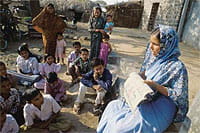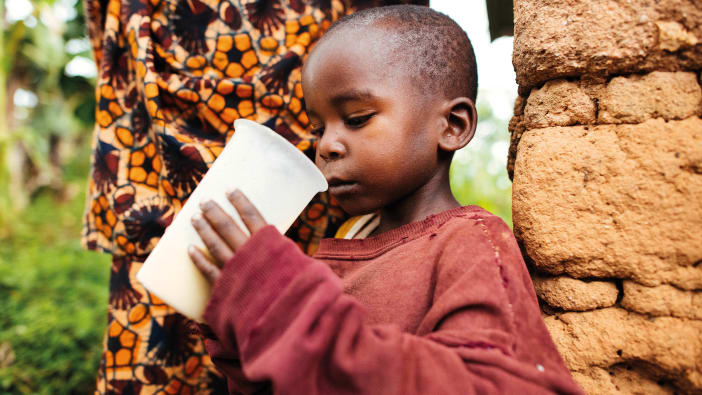People all over the world tend to rely on doctors and on taking medicine when they are sick, whether the illness is minor or more serious. However, most minor ailments can be taken care of at home. Parents and other caregivers can be taught how to recognise common illnesses. They can learn these simple techniques that they can use to treat these illnesses at home. This empowers the caregiver, reduces cost of care and means that people do not have to travel to a hospital unless in an emergency.
Here are some simple guidelines for treating common health problems.
Malnutrition
Good nutrition is vital to maintain good health, and is especially important for young children, pregnant women and people who are sick. Eating enough good, nutritious food helps the body to grow well, resist disease, and recover from illness. When children are malnourished or sick they are often irritable and do not want to eat. Parents may get tired and stop trying to feed their child. This makes the child’s condition worse. Feeding needs patience and persistence. Give small amounts frequently. Do not try to force feed but keep encouraging the child to eat. (Footsteps 72).
Monitoring and recording the weight of a child each month can provide early warning of a health or nutrition problem. It is particularly important in the first two years. Action should be taken quickly if the child’s weight declines or does not increase steadily. Teaching caregivers about growth monitoring provides an opportunity to discuss how to ensure good health and nutrition.
Many adult women are anaemic. This may be because they do not get enough nutritious food due to poverty or cultural practices. Signs of anaemia include pale insides of eyelids and gums, weakness and fatigue. It is very important that women eat enough nutritious foods such as green leafy vegetables, eggs, meat and beans, particularly during pregnancy and after giving birth.
Diarrhoea
Diarrhoea is especially dangerous for babies and small children. Usually no medicine is needed but special care must be taken because babies and young children can die very quickly from dehydration (lack of water in their body). To treat diarrhoea and prevent dehydration it is important to give extra liquids to drink immediately, and to continue feeding. For babies under six months old, keep giving breast milk often. If more fluids are needed then give water that is safe to drink – such as water that has been boiled and then allowed to cool. For children over six months and adults, options for fluids are:
FOOD-BASED FLUIDS such as home-made soup, rice water, coconut water or yoghurt drinks.
SALT–SUGAR SOLUTION Mix one litre of safe water with one level teaspoon (two pinches) of salt and eight level teaspoons (two handfuls) of sugar. Before adding the sugar, taste the drink to check it is not too salty. It should be less salty than tears. Add the juice of half a lime, lemon or orange to improve the taste.
CEREAL DRINK Mix one litre of safe water with one level teaspoon of salt and eight heaped teaspoons of cereal such as powdered rice, finely ground maize, wheat flour, sorghum, or cooked and mashed potatoes. Boil for five minutes to form a watery porridge. Cereal drinks can spoil in a few hours, so keep in a refrigerator or make a new drink every two or three hours.
When correctly prepared, cereal drinks are often cheaper, safer and more effective than the packets of Oral Rehydration Salts (ORS) which can be bought in many places. If using packets of ORS, it is very important to know the exact quantity of safe water to add.
Give as much extra fluid as the person wants, giving small sips often, even if the person vomits. Children under two years old should be given half a cup after each watery stool. Give this slowly from a cup or using a teaspoon, rather than a bottle. Older children need at least one cup for each watery stool. An adult should drink one or two extra cups an hour. Where possible, also provide zinc supplements according to local medical guidelines. Give these as soon as possible once diarrhoea has started and continue giving for 10–14 days.
Coughs and colds
No medicine is needed. Steam inhalation can help to ease breathing difficulties. Place a bowl of hot, steaming water so that the person can breathe in the vapour. It may help to place a sheet or light blanket over their head and the bowl of water. Be careful not to put the bowl so close that the steam or hot bowl burns their face. If a cough persists for a long time, seek medical advice.
Fever
Children often get fevers. When a child has a high temperature, wet a cloth with tepid (not too hot or cold) water and use this to cool down the child’s body. Do not wrap the child up in blankets. Make sure the child drinks a lot of fluids and eats frequently. Make sure the water given is safe for drinking. If the fever persists for more than 24 hours, seek medical attention, particularly if malaria is common in your area.
Injuries
When accidents occur, quick treatment and keeping the wounds clean will help recovery and prevent infection. If someone falls and fractures a limb, place the injured limb in the most natural and pain-free position. Keep it straight and support it by tying on a splint. Be careful not to tie it too tightly. A splint could be made from a straight piece of wood, or other material. Take them to the nearest hospital or health centre.
If someone is cut and is bleeding badly, get the person to lie down. Raise and support the area so that it is higher than their heart. Wash your hands with soap and water. To protect yourself from HIV, avoid contact with blood by wearing plastic gloves or plastic bags over your hands. Clean the wound with clean water, making sure you remove all the dirt, and cover it with a clean cloth. Apply pressure over the wound with your hand to stop the bleeding. Secure this cloth by tying a different clean cloth firmly around the wound. Do not tie it so tightly that it completely cuts off the blood supply. Seek medical advice if:
- bleeding continues or the wound is very severe
- the wound was caused by a bite from a dog or other animal
- signs of infection appear, such as redness, swelling, pus, fever or a bad smell.
Seizures
Sometimes an adult or a child has a seizure (fit). If this happens, do not try to restrain them, but move objects out of the way so they do not injure themselves. Try to prevent a fall. Place the person so they are lying on one side, to prevent them from choking on their vomit or their saliva. Take them to hospital as soon as possible. People who often have seizures should not go too near fires and water sources, or climb to high places, in case a seizure occurs. Many seizures can be prevented by simple medicines, so ask a health worker.
Snake bite
If someone is bitten by a snake, immediately wash the area of the bite. Wrap the bitten area with a wide bandage or clean cloth, but do not tie it so tightly that it cuts off the blood supply. Splint the limb to minimise movement and take them to hospital as soon as possible. Try to identify what type of snake it was.
Providing care
Often just sitting with a person who is sick or injured, talking to them and comforting them, can help them to stay calm and to feel better. With some basic health care information, along with love and concern for the person they are caring for, home caregivers can make effective differences in family health. Home care is as important as hospital-based care.
Dr Shobha Arole is Associate Director of the Community Rural Health Project for Jamkhed.
PO Jamkhed
Dist. Ahmednagar
Maharashtra, 413201
Email: [email protected]
Treating burns
For minor burns that do not form blisters, put the burned part in cold water at once and leave for ten minutes. This should prevent the burn from becoming more severe. No other treatment is needed. For more severe burns seek medical advice if possible. If this is too far away, here are some guidelines:
- Comfort and reassure the burned person. Give aspirin for the pain. Give them plenty of safe water to drink.
- Do not break blisters, as they help the burn to heal.
- Do not put ice on the burn.
- If the blisters are broken, wash gently with soap and boiled water that has been cooled.
- Heat some Vaseline until it boils, let it cool and spread it on a clean piece of gauze or thin cloth. Then place this on the burn loosely so that it does not put pressure on the wound. If there is no Vaseline, leave the burn uncovered.
- It is very important to keep the burn as clean as possible. Protect it from dirt, dust and flies.
- Covering the burn with honey can help to prevent infection and speed healing. Gently wash off the old honey and put on new at least twice a day.
- Never put grease, butter, hides, coffee, herbs or faeces on a burn.
If signs of infection appear, apply cloths soaked in warm salt water (one teaspoon of salt to one litre of water). Change these three times a day. Boil both the water and the cloth before use. Carefully remove the dead skin. Antibiotics may be needed, so consult a health worker.
Adapted from Where There Is No Doctor (2007 Revised Edition), by David Werner with Carol Thuman and Jane Maxwell, published by Hesperian.








